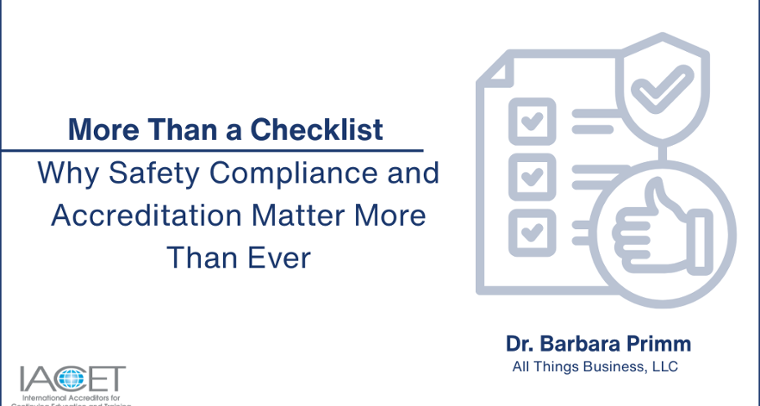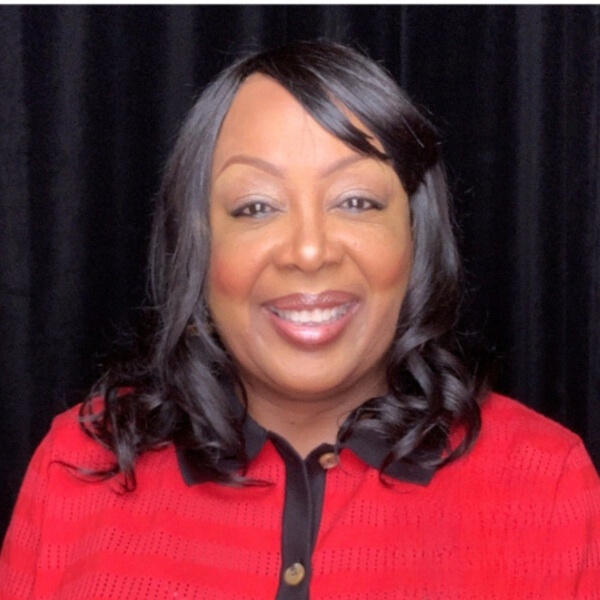More Than a Checklist: Why Safety Compliance and Accreditation Matter More Than Ever

As a Commissioner with the International Accreditors for Continuing Education and Training (IACET), I’ve had the privilege of reviewing programs that span industries and impact thousands of learners. One thing that remains constant across all sectors, especially those involving high-risk environments, is the critical need for safety compliance to be embedded within both the training culture and the credentialing process.
Safety isn’t just a best practice; it’s a standard that protects lives. In the realm of continuing education and training, particularly for industries like construction, manufacturing, transportation, and healthcare, safety protocols are not optional. They must be demonstrated, taught, reinforced, and assessed. Accreditation ensures that these expectations are sustained.
Accreditation Validates More Than Knowledge: It Validates Culture
One of the most overlooked aspects of IACET accreditation is how it validates a culture of accountability. When an organization becomes IACET-accredited, it isn’t simply checking a box. It’s committing to a continuous improvement cycle that reflects a deep concern for the safety, well-being, and skill development of every learner.
Programs that hold IACET accreditation have proven their alignment with the ANSI/IACET Standard for Continuing Education and Training. This includes measurable learning outcomes, qualified instructors, rigorous evaluation, and clear policies for ensuring learner safety, whether in a classroom, lab, or job site.
The Intersection of Compliance and Instructional Quality
As an educator and consultant, I’ve seen organizations with phenomenal technical skills fall short when it comes to documentation, learner engagement, or structured evaluation. Accreditation helps bridge that gap.
For example, OSHA trainers and workforce development programs often provide essential safety content, but without standardized assessment or learner recordkeeping, the long-term impact is uncertain. Accreditation adds the framework necessary to ensure that safety training is delivered, retained, and applied. It supports instructional design that includes real-world simulations, formative feedback, and assessments that verify comprehension.
Why Safety Compliance Needs Accreditation Now More Than Ever
Presently, organizations are navigating increasing regulatory demands, workforce shortages, and public scrutiny. An incident due to noncompliance can lead to more than fines; it can destroy trust. Accreditation provides the assurance that your program meets internationally recognized standards and has systems in place to protect learners and stakeholders.
Moreover, federal and state funding agencies are placing greater emphasis on quality assurance. Accreditation signals that your organization is ready to meet both compliance requirements and performance expectations.
A Call to Action for Training Providers
As a commissioner, I strongly encourage training providers, especially those in safety-sensitive sectors, to pursue IACET accreditation because it represents a higher calling to excellence and not just because it’s required by law.
We owe it to the communities we serve to deliver safe, effective, and credible training. Accreditation doesn’t slow you down; it strengthens your infrastructure, deepens your impact, and enhances your credibility.
Final Thoughts
Safety compliance is a responsibility, and accreditation is a powerful tool that helps organizations meet that responsibility with integrity, transparency, and consistency.
If we want to raise the bar on professional training, we must start with a strong foundation. For me, that foundation is IACET accreditation.
About the Author

Dr. Barbara R. Primm is a respected business consultant, nonprofit strategist, and education leader with a dynamic career rooted in service, leadership, and community impact. She is the Founder and CEO of All Things Business, LLC, a boutique consulting firm specializing in nonprofit development, business formation, accreditation support, and grant consulting for emerging and established organizations.
Dr. Primm holds a Doctorate in Instructional Leadership with a specialization in Andragogy (Adult Learning), and Master’s degrees in both Business Administration and Educational Leadership. Her educational journey reflects a deep commitment to lifelong learning and the advancement of accessible, high-quality training solutions.
In her role as a Commissioner with the International Accreditors for Continuing Education and Training (IACET), Dr. Primm helps uphold and promote global standards for continuing education and training providers. As a recognized IACET consultant, she supports organizations seeking accreditation, guiding them through compliance, program development, and instructional design rooted in measurable outcomes.
Dr. Primm is also a sought-after facilitator and has led high-impact workshops for the United Way of Greater St. Louis and the St. Louis Development Corporation, equipping nonprofit leaders and entrepreneurs with practical tools in board governance, grant writing, program design, and strategic planning. Her engaging, results-driven sessions are designed to educate, empower, and build organizational capacity.
With a passion for excellence, equity, and ethical leadership, Dr. Primm continues to shape the future of education, workforce development, and nonprofit sustainability, one organization at a time.
